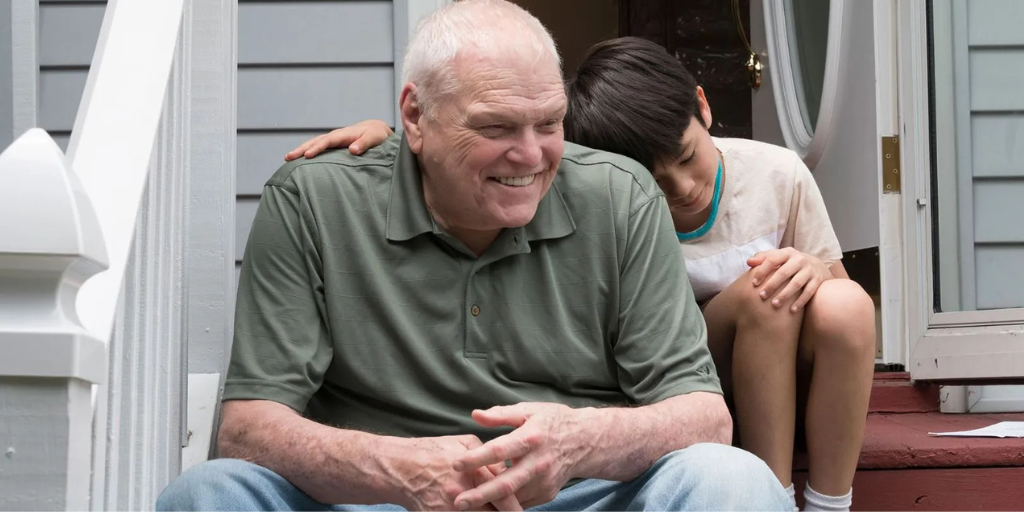The conclusion of Driveways masterfully explores themes of connection and the complexities of change.
- Driveways avoids melodrama, focusing on authenticity and emotional depth.
- The film’s ending highlights life’s complexities and bittersweet goodbyes.
- Del and Cody’s relationship symbolizes everyday acts of care and connection.
The conclusion of Driveways, Andrew Ahn’s acclaimed drama, stands out for its quietly profound approach to loss, friendship, and the power of simple gestures.
The film follows Kathy, a single mother, and her son Cody as they spend a summer clearing out a deceased relative’s home, forming an unexpected bond with Del, an aging Korean War vet living next door.
Rather than resorting to melodrama or exaggerated catharsis, the ending favors authenticity and restraint, which critics say makes it especially moving.
The closing scenes highlight what has shaped the heart of Driveways: two isolated souls, Cody and Del, choosing to connect despite generational and personal barriers. In the film’s final moments, Cody, having grown attached to Del through gentle exchanges and shared time, wishes for their families to remain neighbors.
But reality interferes. Del shares that his daughter wants him to move closer to her, meaning he must leave the house, neighborhood, and friendships he’s cherished. The movie opts against the fantasy of Del and Kathy’s family combining households, instead portraying Del’s departure with tenderness but also painful honesty.
When Cody, heartbroken, runs off, Del walks up the hill to offer comfort, a rare moment of cinematic affection filmed with remarkable sensitivity. The two walk back together, shoulder to shoulder, symbolizing the film’s belief in subtle, everyday acts of care.
Critics note that the ending deliberately avoids easy resolutions, emphasizing how difficult changes, leaving a home, and saying goodbye to friends are deeply human and not easily overwritten by sentimental tropes.
Also read: If Beale Street Could Talk Ending Explained: Love, Loss, and Justice in an Unforgiving System
In the very last scenes, Del’s quiet monologue for Cody attempts to convey life’s complexities in a speech marked by uncertainty rather than wisdom. Cody listens, suggesting that sometimes presence and empathy matter more than perfect answers.
This restrained yet powerful exchange resonated strongly with viewers who, during the pandemic, were acutely aware of what it means to miss connections and process change.
Critics and Fans Respond: Why Driveways’ Ending Feels Personal
“Driveways” found wide acclaim precisely because of its honest depiction of change and connection. Brian Dennehy’s role received significant praise, with many calling it a career-crowning performance that perfectly captured the pain and dignity of aging and letting go.
The intimacy of the final scenes, where the simplicity of Del and Cody’s farewell becomes the film’s most lasting message, invited audiences to revisit their own experiences of separation and transition.


Multiple writers highlighted how the film’s subdued storytelling struck a chord in 2020, when viewers watched through the lens of social distancing and isolation.
The pandemic’s backdrop made Driveways’ meditation on neighborly bonds and emotional openness much more powerful. In an era marked by forced estrangement, small acts like an elderly neighbor offering wisdom or a child reaching across generational divides became deeply important symbols.
The film seamlessly integrates themes of single parenthood, financial anxiety, and cultural difference without heavy-handed commentary. Kathy’s journey as a working mother managing the complex logistics of selling a hoarder’s house is never oversimplified.
Meanwhile, Del’s experience as a veteran and widower, and his reticence to leave his own home, grounded the film in real-world struggles that many people face but rarely see treated with such quiet respect.
Online communities and critics alike have interpreted the ending as a reflection on how real friendships emerge in unexpected places and how even fleeting connections can have a lasting impact.
The farewell scene wasn’t about loss alone; it was about acknowledging that moving forward often means carrying a piece of others with us forever.
Resonance Beyond the Screen: Driveways’ Legacy in Modern Film
As a swan song for Brian Dennehy, Driveways gained additional meaning. Dennehy delivered one of his most heartfelt performances, bringing depth and grace to a character grappling with loneliness and change.
Dennehy’s portrayal of Del, a man both strong and vulnerable, left many viewers teary-eyed, not because the film forced pathos, but because it recognized the complexity of saying goodbye.
Driveways also stands out for its choice to cast Asian-American actors as Kathy and Cody, a directorial decision that enriched the story’s universality while bringing specificity to the characters’ experience.
Andrew Ahn’s direction, grounded in nuance and empathy, turned everyday interactions, shared meals, gentle words, and silent walks into moments of genuine human connection.
The absence of dramatic music cues, the film’s naturalistic dialogue, and the careful attention to environment heighten the authenticity of the ending.
Throughout, Driveways resists manipulating viewers towards easy emotional payoffs. Instead, each gesture and word has space to land, allowing audiences to process grief, hope, and the possibility of transformation in their own ways.
By never rushing the farewell, the ending champions the idea that transitions, whether moving homes, losing loved ones, or realizing dreams, must change and are best handled with kindness and honesty. This approach, quietly radical in today’s cinematic trends, turns Driveways into a quietly revolutionary film that reframes what finales can achieve.
Driveways has built its reputation not on spectacle, but on reminding us that small kindnesses and real conversations can shape lives long after doors have closed.
Its natural, understated ending isn’t just a narrative choice; it’s a statement about how stories and the people in them matter most in the details, not the grand gestures.
Also read: Jungkook and Winter Dating Rumors Spark Netizen Debate Over “Couple Items”
People Also Ask
- What is the main theme of the film Driveways?
-
The main theme of Driveways revolves around loss, friendship, and the power of simple gestures, highlighting the connections formed between individuals despite personal and generational barriers.
- Who are the central characters in Driveways?
-
The central characters are Kathy, a single mother, and her son Cody, who form a bond with their neighbor Del, an aging Korean War veteran.
- How does the film’s ending approach the concept of change?
-
The ending of Driveways portrays change with authenticity and restraint, emphasizing the difficulty of saying goodbye and the emotional weight of moving on.
- What critical reception did Brian Dennehy’s performance receive?
-
Brian Dennehy’s performance in Driveways was widely praised, with many critics calling it a career-crowning role that captured the pain and dignity of aging.
- How did the pandemic influence viewers’ reception of Driveways?
-
The pandemic backdrop made the film’s themes of neighborly bonds and emotional openness resonate more deeply, as audiences were more aware of social distancing and isolation.
- What distinguishes Driveways from other films in its storytelling?
-
Driveways distinguishes itself through its naturalistic dialogue, absence of dramatic music cues, and focus on everyday interactions, allowing for a more authentic portrayal of human connection.








